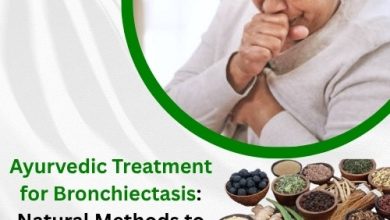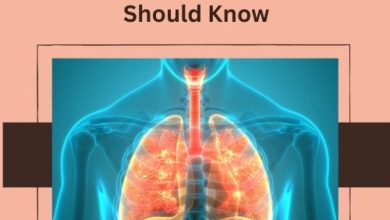Alternative Treatment for Bronchiectasis: Safe, Natural Options That Make a Difference

Living with bronchiectasis can be exhausting, especially when persistent cough, thick mucus, and frequent infections interfere with daily life. While conventional treatments like antibiotics, bronchodilators, and physiotherapy remain the cornerstone of care, many individuals look for alternative treatment for bronchiectasis to complement their medical routines. These treatments focus on reducing inflammation, thinning mucus, and improving lung function—often using natural or holistic approaches.
This article outlines a range of bronchiectasis alternative treatments that may help manage symptoms more effectively and enhance quality of life. Always speak to a healthcare provider before making changes to your treatment plan.
Understanding Bronchiectasis and Its Challenges
Bronchiectasis is a long-term condition where the airways in the lungs become damaged and widened, leading to mucus build-up and recurring infections. Over time, this can reduce lung function and make breathing more difficult.
Conventional medicine primarily targets infection control and mucus clearance. However, many patients find these methods insufficient on their own. That’s where bronchiectasis alternative treatments step in—to offer added support, especially for chronic symptoms and general respiratory well-being.
Related Article: Best Natural Treatment for Bronchiectasis: Practical Remedies That Work

1. Herbal Remedies That Support Lung Health
Several herbs have anti-inflammatory, expectorant, and antimicrobial properties that may help with bronchiectasis. These natural options are often used in traditional medicine and supported by modern research.
Mullein
Mullein is widely used to soothe irritated lungs and clear mucus. It acts as an expectorant, which helps in loosening phlegm and making it easier to expel.
Liquorice Root
This herb reduces inflammation in the airways and may ease coughing. It also has mild antimicrobial effects, which could be useful in fighting off minor infections.
Thyme
Thyme oil and teas are rich in compounds that help thin mucus and relieve congestion. Thyme also has antibacterial properties that may prevent bacterial growth in the lungs.
Many people exploring Alternative Treatment for Bronchiectasis begin with herbal remedies like these, especially in the form of teas, tinctures, or capsules.
Related Article: Promising New Treatments for Bronchiectasis: What You Should Know
2. Breathing Exercises and Airway Clearance Techniques
These methods are critical for managing mucus build-up and maintaining lung function.
Active Cycle of Breathing Technique (ACBT)
This technique combines gentle breathing, deep inhalation, and huff coughing to move mucus from the lungs. It’s safe to perform at home and often recommended by physiotherapists.
Buteyko Breathing Method
Originally developed for asthma, this method focuses on nasal breathing and breath control. Some individuals report better oxygenation and reduced breathlessness after consistent practice.
Pursed-Lip Breathing
Used during physical activity or episodes of shortness of breath, this technique helps slow breathing and keep airways open longer.
Adding these exercises to daily routines can support bronchiectasis alternative treatments and enhance overall lung efficiency.
3. Nutritional Approaches to Reduce Inflammation
Diet plays a vital role in controlling systemic inflammation, which is often elevated in chronic lung diseases.
Anti-Inflammatory Diet
Focus on foods rich in omega-3 fatty acids, antioxidants, and vitamins. These include:
- Fatty fish (sardines, mackerel, salmon)
- Leafy greens
- Berries
- Nuts and seeds
- Olive oil
Avoid processed foods, excessive dairy, and refined sugars as they may trigger inflammation or increase mucus production.
Hydration
Staying well-hydrated helps thin mucus, making it easier to clear the lungs. Warm herbal teas and broths can also provide additional benefits.
For those committed to bronchiectasis alternative treatments, dietary changes can offer gradual yet meaningful improvements in symptoms.
Related Article: Effective Bronchiectasis Treatments That Actually Help You Breathe Easier
4. Supplements That May Support Lung Health
Some supplements have been studied for their effects on respiratory conditions and may complement other therapies.
N-Acetylcysteine (NAC)
This amino acid derivative helps break down mucus and has antioxidant properties. It may also reduce the frequency of flare-ups.
Vitamin D
Low levels of vitamin D are linked to higher infection risk. Supplementation may help support the immune system and reduce inflammation.
Magnesium
Magnesium supports respiratory muscle function and may assist with wheezing or chest tightness.
Quercetin
A natural flavonoid with anti-inflammatory and antihistamine properties, quercetin may help stabilise immune responses in the lungs.
These supplements are commonly included in many bronchiectasis alternative treatments, especially when combined with lifestyle changes and physiotherapy.
5. Steam Inhalation and Essential Oils
Moist air can help loosen mucus and soothe irritated airways. Adding essential oils enhances this effect.
Steam Inhalation
Use a bowl of hot water and a towel over the head to inhale vapour for 5–10 minutes. This helps moisturise the airways and may ease coughing.
Recommended Oils
- Eucalyptus: Opens airways and reduces congestion
- Peppermint: Contains menthol, which provides a cooling, soothing sensation
- Lavender: Promotes relaxation and may ease breathing in stress-related flare-ups
These methods offer fast, non-invasive relief, particularly helpful during acute episodes.
Related Article: Cystic Bronchiectasis Symptoms: What You Need to Know
6. Acupuncture and Traditional Chinese Medicine (TCM)
Some patients report benefits from acupuncture, especially in reducing coughing, easing breathlessness, and improving energy levels. According to TCM, lung qi deficiency plays a role in chronic respiratory conditions like bronchiectasis.
TCM practitioners may use a combination of:
- Acupuncture
- Cupping
- Herbal formulations (e.g., Astragalus, Cordyceps)
Scientific evidence is still developing, but individual reports and some small studies show promising results when acupuncture is used alongside standard treatments.
This growing interest in alternative treatment for bronchiectasis includes ancient systems like TCM, which focus on restoring balance within the body.
Related Article: Ayurvedic Treatment for Bronchiectasis: Natural Methods to Support Lung Health
7. Lifestyle Modifications That Make a Difference
Even small daily changes can improve symptom control and overall well-being.
Regular Physical Activity
Light to moderate exercise improves lung capacity, boosts circulation, and aids in mucus clearance. Walking, swimming, and gentle yoga are all suitable options.
Sleep Quality
Poor sleep can weaken the immune system and increase fatigue. Try to maintain a consistent sleep schedule and keep your bedroom air clean and free from allergens.
Avoiding Triggers
Steer clear of smoking, air pollution, strong fragrances, and dusty environments. These irritants can worsen coughing and increase mucus.
When combined with other bronchiectasis alternative treatments, these habits can support longer-term respiratory health.
Related Article: Early Symptoms of Bronchiectasis: What You Should Watch Out For
8. Psychological Support and Stress Reduction
Chronic illness often affects mental health. Anxiety and depression are common in people managing long-term lung conditions, and stress can make breathing symptoms feel worse.
Useful Strategies
- Mindfulness and meditation
- Cognitive behavioural therapy (CBT)
- Support groups—online or local
A holistic approach includes not only the lungs but also the mind. Emotional resilience improves the ability to manage symptoms and maintain treatment consistency.
Final Thoughts
If you’re exploring an alternative treatment for bronchiectasis, the key is to find options that support your current medical plan and improve your quality of life without replacing essential medications or physiotherapy.
From herbs and supplements to breathing exercises and diet, there are many bronchiectasis alternative treatments that may bring meaningful benefits—especially when used consistently. Always consult your doctor before starting new therapies, especially if you have other health conditions or take regular medication.




